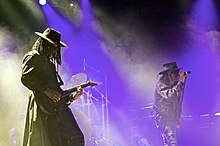Gothic Western
 From Wikipedia the free encyclopedia
From Wikipedia the free encyclopedia
| Part of a series on |
| Westerns |
|---|
 |
Gothic Western (sometimes referred to as Western Gothic and Gothic prairie) is a subculture, artistically similar to gothic Americana, but blends goth and Western lifestyles that are notably visible in fashion, music, film and literature.
History
[edit]
The post-war consciousness between 1940 and 1950 left consumers wanting less monster-related horror in favor of dark storytelling connected with reality. In other words, the monster, subject to relativism, survives in the shadows of the idealized American Dream.[1] Westerns were at their peak of popularity, but with the increase of technology, modernization and social changes, not without artistic commentary. An amalgamation of the two genres befitting this reflection was imminent. In 1971, Johnny Cash introduced the "Man in Black",[2] stating:
"I wear the black for the poor and the beaten down, livin' in the hopeless, hungry side of town, I wear it for the prisoner who has long paid for his crime, but is there because he's a victim of the times."[3]
Larry Vincent, a horror host named Sinister Seymour, established Knott's Halloween Haunt in 1973, one of the first Halloween related events on a large scale, blending Gothic and Western aesthetics at Calico ghost town, and providing a first venue for the growing subculture.[4]
Literature
[edit]In literature,[5] the stereotype of the heroic cowboy gives way to a more complex antihero who has experienced trauma or is overcoming personal tragedy, and often associated to the darker side of Weird West monsters and villainy.[6] The novel The Hawkline Monster: A Gothic Western by Richard Brautigan was one of the first to incorporate the term in its title,[7] while Blood Meridian by Cormac McCarthy and The Dark Tower by Stephen King are also popular examples of the genre. The young adult series, The Goodbye Family by Lorin Morgan-Richards, has been considered Gothic Western with an element of humor.[8]
Music
[edit]
The mixture of goth and Western music has brooding and dark motifs interwoven into cowboy culture while incorporating themes of death, occult and superstition.[9] Crossover elements are seen in gothic country, but are unique to experiences of the American frontier, including Northern Mexico. The music encompasses storytelling and the cultural diversity of instrumentation associated with the American frontier.[10] The spaghetti Western sound of Ennio Morricone is influential to the genre.[11] Tom Waits, Johnny Cash, Steve Earle, The Handsome Family and Richard Marx have written Gothic Western songs.[12]
Film and television
[edit]Filmmaker John Carpenter spoke of the unique quality of the genre, noting it is not the same as a Western horror.[13] In television, Penny Dreadful season three is considered an example of gothic Western, with vampires invading the West.[14] And God Said to Cain,[15] True History of the Kelly Gang[16] and The Power of the Dog[17] have also been referenced as being Gothic Westerns.
Gaming
[edit]Several games have been promoted as Gothic Western, including Darkwatch, West of Dead, Hunt: Showdown, and Evil West.
Fashion
[edit]Gothic Western fashion is a mix of Western wear with goth or Victorian era mourning attire, incorporating black and leather elements.[18]
References
[edit]- ^ "1950s Horror Movies".
- ^ "Flashback: See Johnny Cash's Style-Defining 'Man in Black'". Rolling Stone. 16 February 2016.
- ^ "Why Did Johnny Cash Always Wear Black? 25 Facts about America's Outlaw".
- ^ "Disney's Haunted Mansion and the Invention of Halloween as You Know It". 11 January 2022.
- ^ Hoppenstand, Gary; Browne, Ray Broadus (July 31, 1987). The Gothic World of Stephen King: Landscape of Nightmares. Popular Press. ISBN 9780879724115 – via Google Books.
- Kollin, Susan (September 1, 2000). "Race, Labor, and the Gothic Western: Dispelling Frontier Myths in Dorothy Scarborough's The Wind". MFS Modern Fiction Studies. 46 (3): 675–694. doi:10.1353/mfs.2000.0053. S2CID 162272027 – via Project MUSE. - ^ "The Cowboy and Vampire Collection". Cowboy and Vampire. 16 June 2016. Retrieved October 18, 2020.
- "Western Gothic – The Gothic Network". Google. Archived from the original on 2020-10-25. Retrieved 2020-07-14.
- "10 Western Books Too Twisted To Be Made Into Films". ScreenRant. January 17, 2020.
- Sharf, Zack (May 19, 2020). "Yorgos Lanthimos Set for 'Favourite' Reunion with New Gothic Western Monster Movie". Indiewire. - ^ "'The Hawkline Monster' Will Be a Gothic Western from 'The Favourite' Director Yorgos Lanthimos". /Film. December 17, 2019.
- ^ "Author Interview with Lorin Morgan-Richards". June 19, 2020.
- ^ "Welcome to the Gothic Western Collective Website". January 1, 2018.
- ^ "10 essential gothic western albums". Gothic country.
- ^ "Ennio Morricone obituary: 1928–2020". NME. July 6, 2020.
- ^ Bassoff, Jon (June 20, 2023). "The Western Gothic In Film, Music, And Literature: A Primer". crimereads.com. Lithub. Retrieved June 25, 2024.
- ^ Taylor, Drew (September 5, 2011). "John Carpenter Wants Amy Adams To Star In His "Gothic Western" (In His Dreams)". Indiewire.
- ^ Sarner, Lauren (2 May 2016). "Penny Dreadful' Premiers Season 3 as a Gothic Western". Inverse.
- ^ Todoruk, Jordan (March 1, 2024). "This Spaghetti Horror-Western Gave Us One of the Best Showdowns". collider.com. Valnet Publishing Group. Retrieved June 25, 2024.
- ^ "Review: TRUE HISTORY OF THE KELLY GANG is a Play on the Mythicism of Legends". 20 April 2020.
- ^ "Review: 'The Power of the Dog' is a sublime gothic Western". Associated Press. 17 November 2021.
- ^ "Gothic Western Fashion Part I – Cowgirl Goth". Gothic Americana. August 10, 2019. Archived from the original on July 15, 2020. Retrieved July 15, 2020.